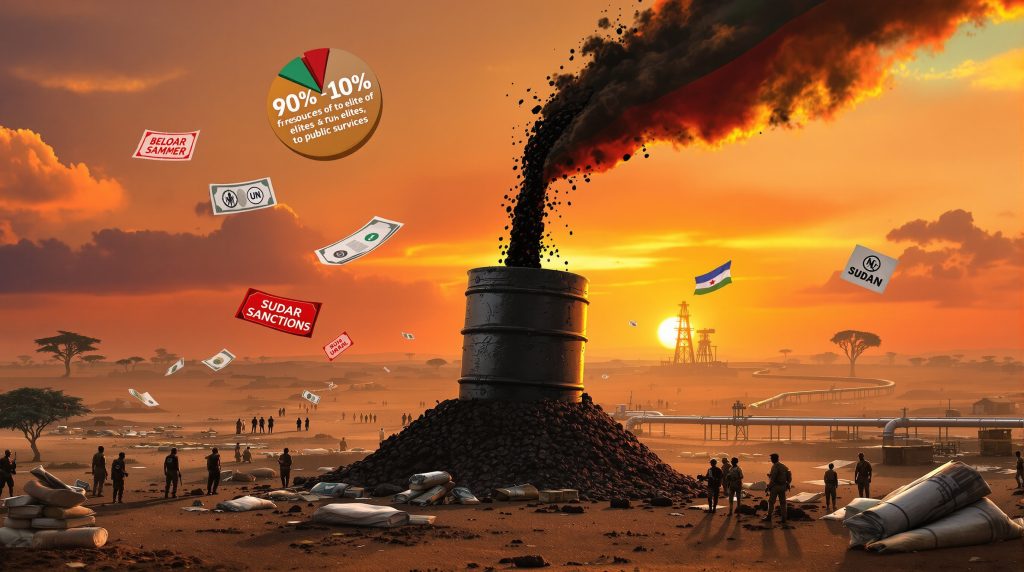Understanding South Sudan's Oil Corruption Crisis: A Systemic Problem South Sudan's oil corruption scheme represents one of the most egregious examples of resource mismanagement in modern history. At its core, it involves the systematic diversion of oil revenues—the nation's primary economic resource—away from public development and into the hands of political elites and their networks. This complex web of corruption has diverted billions of dollars from the world's youngest and one of its poorest nations. The Scale and Structure of the Corruption The corruption operates through multiple interconnected channels: Government-sanctioned embezzlement through official budgets Shell companies linked to political figures receiving no-bid contracts Ghost infrastructure projects that receive funding but deliver minimal or no results Military and security allocations that disappear into private accounts International oil trading schemes that facilitate money laundering The consequences have been devastating for South Sudan's 12 million citizens, with nearly two-thirds facing food insecurity while the country's wealth is systematically plundered. How Much Money Has Been Stolen Through Oil Corruption? The Staggering Financial Impact Recent UN investigations have uncovered the shocking scale of funds diverted from South Sudan's oil sector: Period Amount Diverted Primary Mechanism 2021-2024 $2.2 billion "Oil for Roads" program 2011-2024 $25+ billion (estimated) Various corruption schemes Single Year (2023) $1.7 billion Payments to shell companies The "Oil for Roads" program represents one of the most brazen examples, where over 90% of promised infrastructure was never delivered despite billions in disbursements. This program alone diverted approximately $2.2 billion over just three years, with companies affiliated with high-ranking officials receiving payments for work that was never completed. Who Are the Key Players in South Sudan's Oil Corruption? The Network of Beneficiaries The corruption network extends throughout South Sudan's power structure: Government Officials Vice President Benjamin Bol Mel has been directly implicated in the UN report, with companies linked to him receiving approximately $1.7 billion between 2021-2024 for road construction contracts that were largely unfulfilled. His case exemplifies how political power translates directly into financial gain through the oil sector. Military Leadership Senior military figures benefit from off-budget allocations ostensibly for security purposes. These funds, drawn directly from oil revenues, often disappear into private accounts or are used to maintain personal militias that further destabilize the country. Corporate Enablers A network of shell companies, often registered in neighboring countries or offshore jurisdictions, facilitates the movement of funds. These entities typically have minimal operational capacity but receive substantial government contracts. How Does South Sudan's Oil Industry Function? The Economic Backbone Under Threat South Sudan's economy is overwhelmingly dependent on its oil sector: Production level: Approximately 150,000 barrels per day Economic contribution: Over 90% of GDP, government revenues, and exports Transportation arrangement: 10,000 barrels daily (valued at ~$18 million) paid to Sudan as transportation fees Proven reserves: Estimated at 3.5 billion barrels, positioning South Sudan as having the third-largest oil reserves in sub-Saharan Africa Exploration status: Only about 30% of potential oil-bearing territory has been explored This extreme dependence makes the country particularly vulnerable to both corruption and oil price movements. The nation's reliance on Sudan for oil transportation adds another layer of geopolitical complexity and vulnerability. What Impact Has Corruption Had on South Sudan's Development? The Human Cost of Corruption The diversion of oil revenues has had catastrophic consequences for South Sudan's population: Economic collapse: GDP declined from approximately $12 billion in 2011 (at independence) to just $5.4 billion in 2024 Humanitarian crisis: Nearly two-thirds of the population faces severe food insecurity Infrastructure deficit: Basic services like roads, hospitals, and schools remain severely underdeveloped Conflict perpetuation: Diverted funds often finance armed groups, prolonging civil conflict International isolation: Corruption scandals deter legitimate foreign investment The contrast between the country's resource wealth challenges and the living conditions of its citizens represents one of the starkest examples of the "resource curse" phenomenon globally. How Has the International Community Responded? Global Oversight and Intervention Attempts International responses to South Sudan's oil corruption have included: United Nations Investigations The UN has conducted extensive investigations, culminating in a 101-page report that meticulously documents the systematic looting of oil revenues. The report states unequivocally that "the country has been captured by a predatory elite that has institutionalised the systematic looting of the nation's wealth for private gain." Sanctions Regimes Several key figures in South Sudan's government have faced international tax actions and sanctions, including Vice President Benjamin Bol Mel, who has been sanctioned by the United States for his role in corruption schemes. Aid Conditionality International donors have increasingly attached governance conditions to aid packages, though these have had limited impact on systemic corruption. Civil Society Support International organizations have supported local civil society groups attempting to increase transparency in the oil sector, though these efforts face significant obstacles and risks. How Does South Sudan's Corruption Compare to Other Resource-Rich Nations? The Resource Curse in Comparative Perspective South Sudan's experience with resource-based corruption follows patterns seen in other resource-dependent nations: Mozambique's Gas Wealth Challenges After discovering approximately 180 trillion cubic feet of natural gas reserves in 2010 (equivalent to about 29 billion barrels of oil), Mozambique faced similar corruption challenges. The "hidden loans" scandal, where officials created state-owned companies that borrowed billions off-the-books, severely damaged investor confidence. While Mozambique has managed to launch some LNG exports, major projects remain delayed due to security concerns exacerbated by poor governance. Democratic Republic of Congo's Mining Sector The DRC's vast mineral wealth has similarly been plagued by corruption, with billions in mining revenues disappearing through opaque contracts and political connections rather than benefiting the population. These parallels demonstrate how resource wealth, without strong governance institutions, often becomes a catalyst for corruption rather than development. What Solutions Could Address South Sudan's Oil Corruption? Potential Pathways to Reform Addressing South Sudan's entrenched corruption will require multi-faceted approaches: Transparency Mechanisms Implementing the Extractive Industries Transparency Initiative (EITI) standards could help track oil revenues from extraction to expenditure, making diversion more difficult. International Oversight Independent monitoring of oil revenues and expenditures by international bodies could provide accountability that domestic institutions currently lack. Legal Reforms Strengthening anti-corruption laws and, crucially, their enforcement would create consequences for corrupt practices that currently go unpunished. Civil Society Empowerment Supporting independent watchdogs and media to investigate and publicize corruption could create domestic pressure for reform. Economic Diversification Reducing the overwhelming dependence on oil would diminish the leverage of those controlling the sector and create alternative economic opportunities. Additionally, understanding potential oil price crash insights is crucial for planning economic alternatives. What Are the Security Implications of Oil Corruption in South Sudan? The Corruption-Conflict Nexus Oil corruption and regional instability create a dangerous feedback loop: Civil conflict financing: Diverted oil revenues often fund armed groups, perpetuating violence Regional tensions: The relationship with Sudan remains precarious, with oil transportation a key point of leverage Military factionalism: Competition for oil revenues encourages military leaders to maintain personal militias Border disputes: Oil-rich regions often become flashpoints for territorial conflicts Humanitarian access: Corruption-fueled insecurity limits humanitarian organizations' ability to reach vulnerable populations The 2013-2020 civil war, which claimed approximately 400,000 lives, was fueled in part by competition for control over oil resources and revenues. Current tensions between the Sudanese Armed Forces (SAF) and the Rapid Support Forces (RSF) threaten to disrupt South Sudan's oil exports, potentially triggering economic collapse. FAQ: South Sudan's Oil Corruption Crisis How does South Sudan's oil reach international markets? South Sudan is landlocked and must transport its oil through pipelines crossing Sudan to reach Port Sudan on the Red Sea. This arrangement costs South Sudan approximately 10,000 barrels daily (worth around $18 million) in transportation fees to Sudan, creating both economic drain and geopolitical vulnerability. Has anyone been prosecuted for corruption in South Sudan's oil sector? Despite overwhelming evidence of massive corruption, prosecutions have been virtually non-existent. The political figures involved typically control the very institutions that would be responsible for investigations and prosecutions, creating a system of impunity. What percentage of South Sudan's oil wealth actually benefits its citizens? While precise figures are difficult to establish due to opacity in government finances, UN investigations suggest that less than 10% of oil revenues translate into public services or development projects that benefit the general population. How does oil corruption affect humanitarian aid to South Sudan? Corruption creates a paradoxical situation where one of Africa's most resource-rich nations requires massive humanitarian assistance. Aid organizations must navigate complex political landscapes where the same officials diverting oil revenues may control access to vulnerable populations. What role do international oil companies play in South Sudan's corruption? While international oil companies are not directly implicated in the diversion of revenues after they're paid to the government, questions remain about their due diligence and willingness to operate in an environment with such endemic corruption. Some companies have faced criticism for continuing operations despite clear evidence that oil revenues fuel conflict and corruption. Conclusion: The Path Forward for South Sudan's Oil Wealth South Sudan's oil corruption crisis represents one of the most stark examples globally of how resource wealth can become a curse rather than a blessing. The systematic diversion of billions in oil revenues has devastated the world's youngest nation, contributing to economic collapse, humanitarian crisis, and persistent conflict. Breaking this cycle will require coordinated efforts from domestic reformers, international partners, civil society, and the private sector. Transparency mechanisms, accountability systems, and economic diversification represent critical steps toward ensuring that South Sudan's substantial oil wealth finally begins to benefit its citizens rather than enriching a predatory elite. Until meaningful reforms are implemented, South Sudan will remain a cautionary tale about the dangers of resource wealth without robust governance—a nation rich in oil but impoverished by corruption and subject to global trade distortions that further complicate its economic future. Ready to Spot the Next Major Mineral Discovery? Discover why significant resource finds can lead to exceptional market returns by exploring Discovery Alert's dedicated discoveries page, where their proprietary Discovery IQ model transforms complex mineral data into actionable investment insights. Begin your 30-day free trial today at Discovery Alert to position yourself ahead of the market.

Comprehensive Guide to Blasting Operations at Loulo-Gounkoto Mine
Discover how advanced explosive methods, safety protocols, and technologies drive



